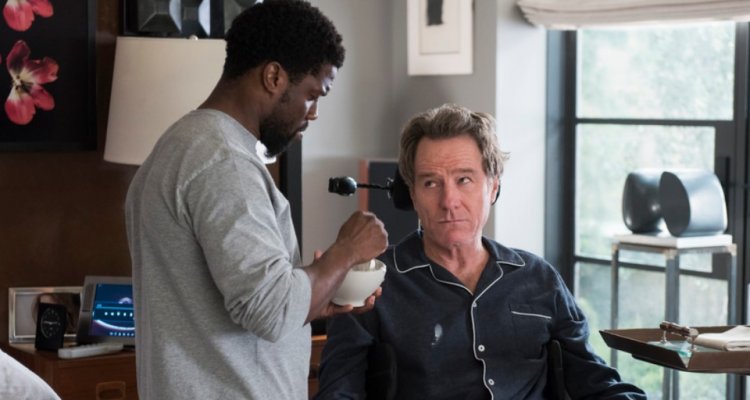Releasing “The Upside” in the dead of January, rather than in November or December, probably tells you all you need to know about what its own press notes call an “inspirational comedy.” With halfway-to-his-EGOT Bryan Cranston starring as a billionaire with quadriplegia alongside Oscar winner Nicole Kidman in de-glammed mode (she’s wearing glasses!), this should be the exact type of based-on-a-true-story film that would’ve been released at the end of the year in the hopes of an awards run. But beyond strong performances from Cranston and Kidman, “The Upside” isn’t angling for prestige audiences, and that’s probably its smartest move. This isn’t an awards contender, but it also isn’t as truly terrible as it could’ve been, mostly avoiding pure, tooth-achingly sweet sentimentality.
In addition to being based on a true story, “The Upside” is an English-language remake of the French film “The Intouchables,” and follows its source’s structure and emotional beats, diverging in a few places but never enough to truly justify its existence as anything beyond a cash grab and an opportunity for Kevin Hart to play a slightly more serious role in a character with a real arc. As abrasive as Hart has been off-screen lately, his character here is no better for much of the film. He stars here as Dell, an ex-con who blunders into an interview with Park Avenue penthouse owner Phillip (Cranston), who needs a live-in caregiver. Against the advice of his business manager Yvonne (Kidman, in a supporting role that I cannot figure out why she took), Phillip hires Dell, despite their disparate backgrounds and Dell’s lack of experience taking care of a person with quadriplegia. Phillip loves opera (as all rich movie dudes do), and Dell can’t stand it. Anyone who hasn’t seen a movie before will have questions: Will they become friends? Will Phillip learn how to enjoy life? And will Dell grow to like opera?
“The Upside” isn’t content to just rely on a single movie trope; instead it simultaneously braces itself on the overused ideas of “fish out of water,” “the unlikely friendship” and a “sick/disabled person learns how to truly live.” It’s never as bad as it could be, largely thanks to the performances from Cranston, Hart, Kidman and an underused Golshifteh Farahani as Phillip’s physical therapist. Cranston and Hart don’t quite have the chemistry of either of their best comedic pairings – with Dwayne Johnson and Jane Kaczmarek, respectively – but they still bounce off each other with enough energy to lift the film beyond its bounds, particularly in a late-night Gray’s Papaya hot dog run by Dell and Phillip that is the highlight of the film. Though Hart is good in the more dramatic moments, he doesn’t modulate in the comedic ones, always going big, even when the moment doesn’t call for it. The movie is never funny enough to justify that amplified of a performance.
The script is the feature debut of Jon Hartmere, and it avoids all depth like a floaties-wearing child. It doesn’t trust its audience to intuit the nuances of Dell and Phillip’s lives or their friendship, with the physically paralyzed Phillip literally saying (repeatedly), “I don’t feel anything,” when he’s emotionally numb. It spells out its themes of the invisibility of people on society’s margins and how we’re not really all that different, despite what the surface tells us. “The Upside” is the type of movie that should be good for people who loudly – it’s never quietly – ask inane questions while watching movies.
Director Neil Burger has never really reached the heights of his breakthrough in “The Illusionist,” but “The Upside” is a capably made film on the technical side. It looks great, both in its cinematography from Stuart Dryburgh and some really nice art direction from Kim Jennings that believably depicts the wealth and poverty that exist side by side in New York City. Rob Simonsen‘s elegant classical score is lovely and works well in parallel with Phillip’s passion for opera.
But “The Upside” has little of that grace otherwise. Though anchored by strong performances that ultimately make it watchable, the surrounding film stumbles along thanks to a bumbling script that’s devoid of any originality. [C]

